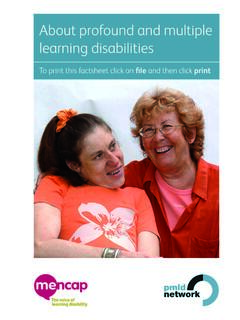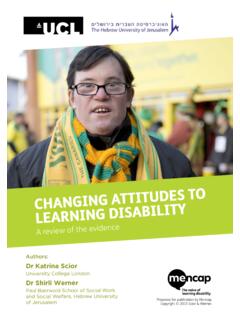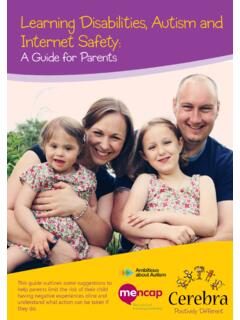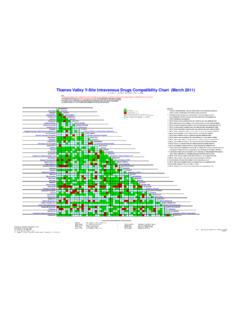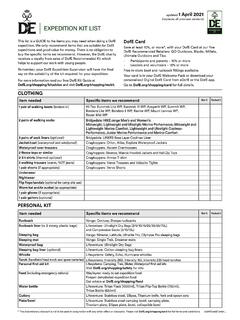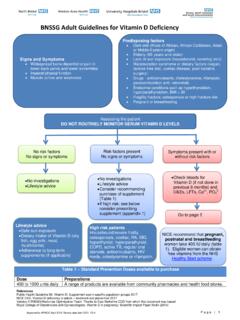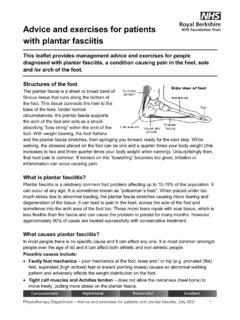Transcription of Death by indifference: 74 deaths and counting - Mencap
1 NHS accused over deaths of disabled patientsthe Guardian: 3 January 2012 Death by indifference: 74 deaths and countingA progress report 5 years Death by Indifference Update 113/02/2012 18:392 ContentsIntroduction 1 74 cases and counting 4 The contributory factors 8 Lack of basic care 9 Poor communication 10 Delays in diagnosis and treatment 12 Failure to recognise pain 14 Do Not Resuscitate orders and the Mental Capacity Act 2005 15 Fighting for justice and change 17 Progress on the Healthcare for all recommendations 20 Conclusion 29 Appendix 31 References Death by Indifference Update 213/02/2012 18:391 IntroductionIn March 2007, Mencap published Death by indifference, which reported the appalling deaths of six people with a learning disability deaths that the six families involved and Mencap believe were the result of failings in the NHS.
2 The report put the spotlight on the tragic consequences of the healthcare inequalities experienced by people with a learning disability. These inequalities had been clear for years, but it took the deaths of Emma, Mark, Martin, Ted, Tom and Warren and the bravery of their families in telling their stories to bring about by indifference triggered an independent inquiry and an investigation of the six cases by the Parliamentary and Health Service Ombudsman. This resulted in the government accepting all the recommendations of the inquiry and setting out their delivery in the Department of Health strategy for people with a learning disability, Valuing People reports 2004: Treat me right!, Mencap 2007: Death by indifference, Mencap2008: Healthcare for all: report of the independent inquiry into access to healthcare for people with learning disabilities, Department of Health2008: Six Lives, Parliamentary and Health Service Ombudsman2009: Valuing People Now, Department of Health2010: Six Lives Progress Report, Department of Death by Indifference Update 113/02/2012 18:392 Mencap knows there are parts of the NHS, as well as other organisations and individuals, that are making a real effort to address the problems of access to equal healthcare for people with a learning disability.
3 More than 200 healthcare organisations have signed up to our Getting it right charter. We have also been extremely impressed by the work of some Strategic Health Authorities and key individuals, such as learning disability liaison nurses, and the excellent examples of good practice that have been shared with us. But equal healthcare is a legal obligation that should be embedded in the everyday running of the NHS, in every GP practice and in every hospital ward, not an exercise in identifying pockets of good publication of the Death by indifference report also prompted a number of families to contact Mencap , and they continued to do so in the weeks, months and years that followed. It is these cases a total of 74 to date that form the basis of the article published in the Guardian on 3 January 2012.
4 Mencap believes they are only a tiny proportion of the actual number of such cases. They do, however, highlight an NHS that continues to fail people with a learning disability, doctors whose practices appear to show no regard to the Equality Act or Mental Capacity Act, and nurses who fail to provide even basic care to people with a learning shocking cases, each as serious as the six in our Death by indifference report, must also be seen in the wider context of the strong criticisms made about the performance of the NHS in regard to other vulnerable patients, such as older These accounts echo our own concerns that the NHS is too often failing to provide the most basic nursing care such as nutrition, hydration and pain relief, and is denying people dignity and respect.
5 This lack of dignity and respect, together with the poor nursing care that is too often experienced by people with a learning disability, is illustrated by Alan s Death by Indifference Update 213/02/2012 18:393 Alan MacDonald Alan MacDonald died suddenly in Lister Hospital, Stevenage, on 20 December 2009, aged 53. Alan had lived independently with his wife, supported by carers. Alan had Down s syndrome and a moderate learning disability, and was considered by his family to have a full and active life . He enjoyed going to the day centre and local cricket club. Three days before admission to hospital, Alan was noted by his family to be in fine form . However, on 15 December 2009, he was admitted to hospital with abdominal pain and diarrhoea.
6 From the time Alan was admitted, his family felt they had to beg staff to treat him, only to be met with hostility . On one occasion, for example, a member of Alan s family who is a doctor asked nurses to give him paracetamol intravenously to treat his dangerously high temperature. She said that this request was again met with hostility . Summing up her feelings about Alan s nursing care at the hospital, she said: I felt the nurses on the ward did not respect a gravely ill patient with special needs and a grieving family. Instead of using respect, tact, care and understanding, I and the rest of Alan s family were faced with hostility, disrespect and no consideration for the distressing situation. The cause of Death was multiple organ failure, sepsis and bronchopneumonia.
7 After a protracted complaint against it by Alan s family, the hospital has finally apologised for the attitude of some of its nursing staff. But, for the family, the lack of respect shown for their loved one is something that will never be forgotten. It is now nearly five years since Mencap published Death by indifference3. In this report, we consider the steps that have been taken, the progress made as a consequence and what we believe still remains to be done. We pay particular attention to deaths that have been reported to us between 2009 and 2011. We do this because it is these cases that illustrate most strongly our serious ongoing concerns that not enough progress has yet been made in addressing the health inequalities experienced by people with a learning disability.
8 Death by Indifference Update 313/02/2012 18:39474 cases and counting Every person who reports their concerns about their relative s Death is a person too many. Dr Pauline Heslop, Director of the Confidential Inquiry into the Premature deaths of People with Learning Disabilities4 What do the deaths of 74 people over the last decade tell us about the progress of the NHS in tackling the health inequalities of people with a learning disability?This section of the report explains how we gathered the 74 cases and what they have in common in terms of the factors that we and the families of the deceased believe contributed to their deaths .
9 It must be said at the outset that these 74 cases were all brought to our attention because of someone s strong belief that their loved one s Death , or the distress they experienced up until their Death , could have been avoided; they are not drawn from any sort of scientific study. They do not, therefore, tell us how many other cases there were across the country or, indeed, in the same hospital, or where else there were similar failings in treatment and care. The scale of the problems will only be known when the Confidential Inquiry into the Premature deaths of People with Learning Disabilities reports to the Department of Health in 2013. These 74 cases do, however, provide a litmus test of progress. They are sufficient and serious enough for Mencap to raise strongly held concerns that progress is neither wide nor deep enough to have effected real change in all parts of the NHS.
10 The 74 cases are listed in the appendix to show each person s name or initials, the date of their Death , the place of Death , the contributory factors and the stage of complaint. Many families simply wanted to tell us their story and to say that what happened to their loved one echoed the stories in our Death by indifference report. For most of these cases, either it was far too late to complain to the NHS or this was not what the family wanted (see table 1 in the appendix). With the families agreement, we have summarised these stories and included them in our submission to the Michael inquiry and in our oral evidence session in the autumn of 20075. We have categorised them into three groups: Death by Indifference Update 413/02/2012 18:3951.
